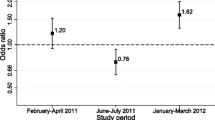Abstract
Objective To test the hypothesis that questionnaire organization affects the recall of antimalarial drugs utilization. Setting Maputo, Mozambique. Methods Treatment of last malaria episode was assessed using two alternative versions (A and B) of a questionnaire, which differed only by the order each proposed drug was presented in the response options (version A: quinine and most frequently used drugs presented first; version B: less frequently used drugs first and quinine at the end). Questionnaires A or B were randomly assigned to each of 32 classes in a private University in Maputo, Mozambique. Within each classroom all subjects received the same questionnaire version, and a similar number of participants fulfilled questionnaires A (n = 249) and B (n = 255). Main outcome measures Recall of the antimalarial drugs utilization in a previous malaria episode. Results Mefloquine and clindamycin were not used by any subject in the last malaria episode. The overall recall of quinine utilization was higher with questionnaire A (19.5% vs. 11.6%, P = 0.006) and the use of artemisinine/artesunate was reported more frequently by subjects inquired with questionnaire B (16.5% vs. 7.3%, P = 0.012). When considering subjects reporting more than one malaria episode, the recall of quinine utilization was higher with questionnaire A (20.0% vs. 6.4%, P = 0.004), and the use of artemisinine/artesunate was reported more frequently by subjects inquired with questionnaire B (18.3% vs. 8.8%, P = 0.069). No differences were observed among those having had only one malaria episode, neither for quinine (22.2% vs. 20.0%, P = 0.807) or artemisinine/artesunate (5.0% vs. 6.7%, P = 0.701). Conclusion The structure of the questionnaire used to collect self-reported information about antimalarial treatments influences the recall, even when close ended questions asking for specific drugs are used. Among subjects having been treated for malaria more than once, the first antimalarial drugs being asked were more likely to be selected.
Similar content being viewed by others
References
Heerdink ER, Leufkens HG, Koppedraaijer C, Bakker A. Information on drug use in the elderly: a comparison of pharmacy, general-practitioner and patient data. Pharm World Sci. 1995;17(1):20–4.
Klungel OH, de Boer A, Paes AH, Herings RM, Seidell JC, Bakker A. Influence of question structure on the recall of self-reported drug use. J Clin Epidemiol. 2000;53(3):273–7.
Schwarz A, Faber U, Borner K, Keller F, Offermann G, Molzahn M. Reliability of drug history in analgesic users. Lancet. 1984;2(8412):1163–4.
Goodman MT, Nomura AM, Wilkens LR, Kolonel LN. Agreement between interview information and physician records on history of menopausal estrogen use. Am J Epidemiol. 1990;131(5):815–25.
West SL, Savitz DA, Koch G, Strom BL, Guess HA, Hartzema A. Recall accuracy for prescription medications: self-report compared with database information. Am J Epidemiol. 1995;142(10):1103–12.
Van den Brandt PA, Petri H, Dorant E, Goldbohm RA, Van de Crommert S. Comparison of questionnaire information and pharmacy data on drug use. Pharm Weekbl Sci. 1991;13(2):91–6.
Johnson RE, Vollmer WM. Comparing sources of drug data about the elderly. J Am Geriatr Soc. 1991;39(11):1079–84.
Gmel G. Changing the order of questions on drug use in the Swiss Health Survey–does it effect prevalence assessment?. Soz Praventivmed. 1999;44(3):126–36.
Mitchell AA, Cottler LB, Shapiro S. Effect of questionnaire design on recall of drug exposure in pregnancy. Am J Epidemiol. 1986;123(4):670–6.
Bowling A. Mode of questionnaire administration can have serious effects on data quality. J Public Health (Oxf). 2005;27(3):281–91.
International Travel and Health: situation as on 1 January 2005. Geneva: World Health Organization; 2005. ISBN: 92 4 158036 4.
Dgedge M, Novoa A, Macassa G, Sacarlal J, Black J, Michaud C, et al. The burden of disease in Maputo City, Mozambique: registered and autopsied deaths in 1994. Bull World Health Organ. 2001;79(6):546–52.
Romagosa C, Ordi J, Saute F, Quinto L, Machungo F, Ismail MR, et al. Seasonal variations in maternal mortality in Maputo, Mozambique: the role of malaria. Trop Med Int Health. 2007;12(1):62–7.
Saute F, Aponte J, Almeda J, Ascaso C, Vaz N, Dgedge M, et al. Malaria in southern Mozambique: incidence of clinical malaria in children living in a rural community in Manhica district. Trans R Soc Trop Med Hyg. 2003;97(6):655–60.
Dean AG, Dean JA, Coulombier D, Burton AH, Brendel KA, Smith DC. Epi Info, version 6.04d: a word processing, database, and statistics for epidemiology in microcomputers. Atlanta, USA: Centers for Disease Control and Prevention, Geneva, Switzerland: World Health Organization; 1996.
Bland M. Cluster randomised trials in the medical literature [document on the Internet]. 2003 [updated 2005 Jan 12; cited 01/07/2007]; Available from: http://www-users.york.ac.uk/∼mb55/talks/clusml.htm.
Bland JM. Cluster randomised trials in the medical literature: two bibliometric surveys. BMC Med Res Methodol. 2004;4:21.
Peters TJ, Richards SH, Bankhead CR, Ades AE, Sterne JA. Comparison of methods for analysing cluster randomized trials: an example involving a factorial design. Int J Epidemiol. 2003;32(5):840–6.
Boynton PM, Greenhalgh T. Selecting, designing, and developing your questionnaire. BMJ. 2004;328(7451):1312–5.
Blumenschein K, Johannesson M. Use of contingent valuation to place a monetary value on pharmacy services: an overview and review of the literature. Clin Ther. 1999;21(8):1402–17; discussion 1.
Acknowledgements
This study was conducted with the support of the ISCTEM (Higher Institute of Sciences and Technology from Mozambique).
Conflicts of interest The authors declare that there are no conflicts of interest to disclose.
Author information
Authors and Affiliations
Corresponding author
Appendix 1
Appendix 1
Structure of the questionnaire A * used to evaluate malaria treatment †

* in questionnaire B, the antimalarial drugs are presented in the following order: clindamycin, tetracyclines/doxycycline, halofantrine, artemisinine/artesunate, mefloquine, lumefantrine + artemether, chloroquine, sulfadoxine-pyrimethamine, amodiaquine, quinine);
† a full questionnaire version is available from the authors by request.
Rights and permissions
About this article
Cite this article
Lunet, N., Bastos, J., Cumaio, F. et al. Recall of drug utilization depends on subtle structural questionnaire characteristics. Pharm World Sci 30, 175–181 (2008). https://doi.org/10.1007/s11096-007-9161-8
Received:
Accepted:
Published:
Issue Date:
DOI: https://doi.org/10.1007/s11096-007-9161-8




